Can you make every day feel like Saturday? — # S W L H — Medium
Can you make every day feel like Saturday?
Disclaimer: This post took me 2 years and 89 revisions. It’s 18-minutes long but I wouldn’t publish it if I didn’t think every minute would be worth it for you.
It started on a Saturday morning when I went to do work. I thought to myself, “Doing work right now feels good. But why does working today feel different than when I was working yesterday or any other weekday?”
I realized, even though I‘m doing work I enjoy and I have been fortunate to have many good things in my life, my happiest days still tend to be constrained to weekends. I searched for why I was feeling this way and through multiple experiments, I stumbled on some unexpected answers.
I’ve shared this story here with the hope there will be something you can take away that might trigger a way for you to better understand how you can feel happier and less stressed about every day. To make every day feel a bit more like those fresh Saturday mornings. Because if we’re only feeling our best two out of seven days of our lives, what’s the point?
We’re happiest on Saturdays at 7:26pm.
At least that’s what this survey found. While the exact time of 7:26pm seems strange, there have been multiple studies to back up that people are generally happier on weekends.
A team of researchers from Rochester University found that regardless of how much money you make, how many hours you work, or even what you do for a living, people are happiest on Saturdays and Sundays.
Even unemployed people feel happier on weekends, according to a Stanford study.
It seems that ‘Weekend Happiness’ is something we all tend to feel regardless of what’s happening in our lives.
Even though I love my work and have the freedom to set my own schedule, I know I feel less stressed on the weekends also. All this made me ask:
Why does a Saturday feel different than a Wednesday?
Designing a happiness experiment
To find out what it was about the weekend that made it feel that much better, I decided to design an experiment, with myself as lab rat.
The idea was that if I could uncover my main sources of stress and happiness, I’d be in a better position to understand what it was that made weekends feel differently than weekdays.
To look for patterns in what made me happy and stressed, I tracked the following factors over 10 days:
- What I ate/drank
- How many hours I slept
- Any major events (i.e. parties, dinners with friends, etc…)
Each day I also recorded:
- A 1–2 sentence summary of how I felt at the end of the day
- A 1–10 rating for the day (10 being a perfect day)
Initially I’d planned to run the test over a longer period of time, but even after just 10 days clear patterns started to emerge.
The first thing that struck me after looking over my daily ratings, was how I hadn’t rated a single day higher than 8/10.
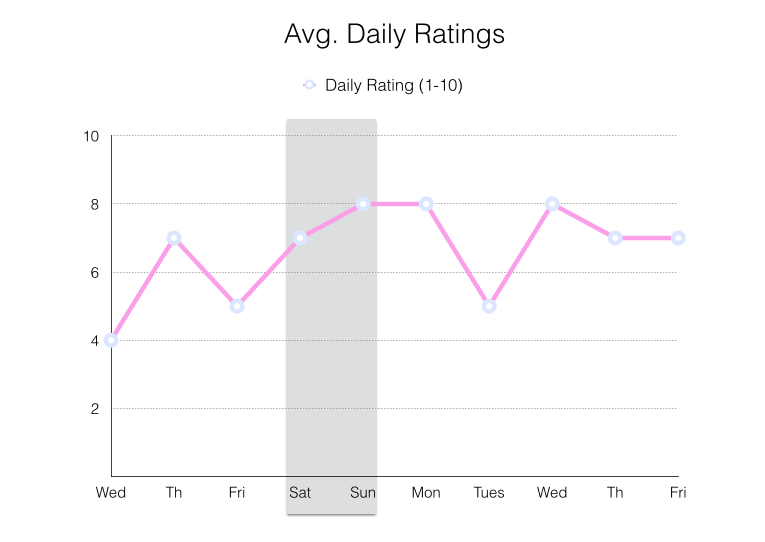
In fact, my average daily rating was a 6.6/10. Slightly better than average.
When I saw this, it made me stop and think about how I’m living — how I’m taking for granted so many good things that have happened in my life.
I was fortunate to be born into a stable, loving family that encouraged me to learn.
I paid off my student debt and married my dream girl.
And for most of the last decade, I’ve been doing work I love and making a living from it.
This is the life I wanted and have been working towards. So shouldn’t I be rating every day a 10?
I knew there was some cause that kept pulling my daily satisfaction lower. And looking at my own numbers, that something seemed to be happening during the weekdays.
Here’s a comparison of how I rated an average weekday compared to a weekend day:
My average week day rating (Monday-Friday): 6.4/10
My average weekend day rating (Saturday-Sunday): 7.5/10
To get to the bottom of my discontent, I looked through all of my daily entries and listed the common things that either made me feel happy or stressed.
My sources of happiness:
- Lower work demands
- Less stress from other people
- Getting enough sleep
- Spending enough time working on a creative task (in my case, writing)
- Working on the most important thing every day
- Meeting up with friends/family
- Doing good, focused work in the morning
- Playing a sport or getting exercise
- Eating healthy
My sources of stress:
- Not getting enough done in a day
- Interruptions
- Arguments
- Doing tasks I view as less important (i.e. moving furniture, cleaning the bathroom)
- Eating heavy/unhealthy food
- No physical activity (no gym workout/soccer/stretching/a long walk)
I noticed that (probably as expectedly) the more happiness factors I had in a day, the higher I rated that day. On the two days where I experienced 4/5 major happiness factors I rated those days 8/10.
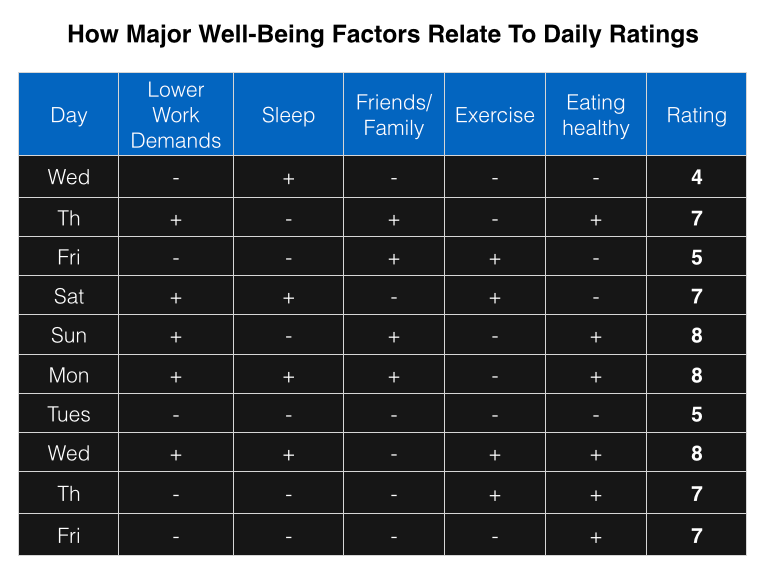
The more happy moments per day, the better. But what about stressors?
As I peeled back the layers on the makeup of good days and bad, I noticed one source of stress that appeared to be the root cause of all bad days: the constant pressure to complete ‘enough work’ during a day.
Avg. daily rating when I thought I did enough work: 7.6/10
Avg. daily rating when I thought I did not do enough work: 5.6/10
When I felt there was too much to do in a day, tasks I viewed as less important and interruptions irritated me more. This would often snowball into arguments, eating fast (and often unhealthy), or skipping workouts to save time.
To validate my feeling that this one source of stress was hurting me the most, I looked at the average overall ratings across days where each stress source was present or not and then used the variation to see which factor actually had the biggest impact.
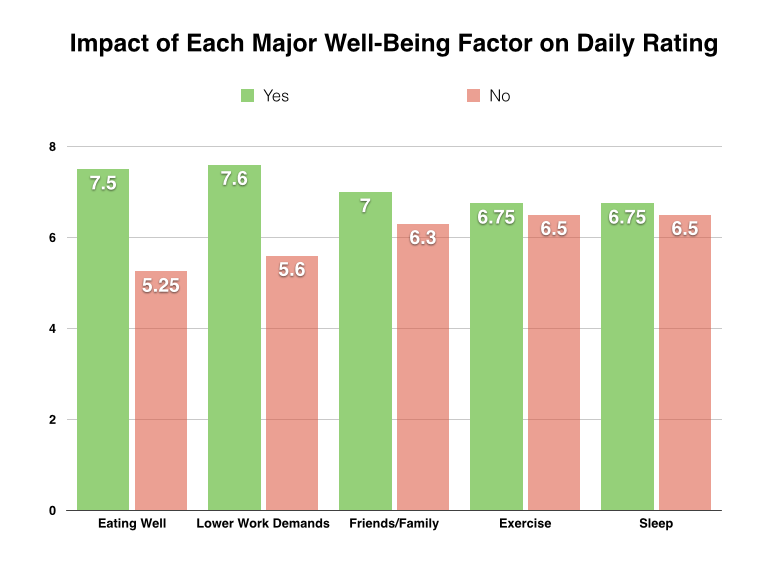
It was obvious that the pressure to get enough work done was a key driver of stress for me. And while I know that this often comes from the pressure I put on myself, it seemed like sometimes there were external forces at play. Especially during the week.
Secondhand Stress: The case of the Monday through Fridays
My wife and I are similar in many ways, but when it comes to the way we work, we’re very different.
I reserve mornings for quiet, focused work. No phone. No email. While my wife prefers to catch up on calls and check emails.
Because she’s also my co-founder, many things she sees in her email relate to me. As soon as I wake up, I’m updated on what’s going on, which is likely something that’s also stressing her out. This immediately gets my blood pumping, making it harder for me to focus on the work I had pre-determined as most important to do.
I learned about a term called Secondhand Stress, which is the way stress can be transferred from person to person.
We evolved to recognize when someone is stressed because it was an advantage to survival. If you could empathize well, this would be key when it came to sharing things like food, shelter, or water. If you see someone pacing back and forth or speaking in an angry way, your levels of the stress hormone cortisol will naturally start to increase. Mirror neurons in your brain will fire whether you like it or not.
While this level of empathy is good for making friends, when it comes to managing stress, it can have an uncontrollable negative effect.
The network effect of stress
Secondhand Stress may even be worse than your own stress because it’s entirely out of your control.
Even if you’re good at managing your own emotions, if someone around you is stressed, you’ll feel stressed. The more people around you are stressed, the more the feeling multiplies.
Stress acts like a network effect — a term most commonly used in business to describe how a product can spread quickly as more people use it (think the exponential growth of Facebook or Uber, for example).
If you’ve been in heavy traffic you’ve experienced the network effect of stress. Even though you might not be stressed, you can feel that people around you are. There’s honking and people cutting each other off or yelling in their cars.
Compounding Secondhand Stress is one of the main reasons we feel more stress during the week. Although more and more companies are adopting a more flexible work schedule, businesses around the world still work on a 40-hour work week expectation.
Because many people around you (customers, teammates, friends, and family) are working at the same time, this can force you into a schedule you can’t control.
Everyone has their own list of things to get done. And the more people you work with, the more lists you’re likely on. During the week, there’s more emails, more meetings, and more expectations. We become overwhelmed. Things spiral out of control.
What’s more, many people also don’t enjoy their work (research firm Gallup found that about 70% of people are unhappy with their work) which leads to a deeper disconnected feeling, resulting in more stress, and even lower feelings of well-being.
When the world around you feels stressed or dissatisfied, these feelings easily rub off on you.
Researchers from Rochester University discovered similar results when they recorded the moods of 74 full-time working adults between the ages of 18 and 62. The researchers paged the participants at different times and asked them to share how they were feeling.
They found that participants had higher feelings of well-being on the weekends with 2 variables having the biggest impact on positive vibes:
1. Autonomy: The ability to choose what they want to do.
2. Connectedness: The opportunity to spend time with people they are closest with.
Weekends produced a greater sense of both autonomy and connectedness because more people felt they had free time and could choose what they wanted to do and with whom.
Weekends: high autonomy + high connectedness = positive well-being
Weekdays: low autonomy + low connectedness = low well-being
I knew spending time with family and friends made me happy but I didn’t expect how great a source of happiness it was until I ran my experiment. (It was my third biggest source of happiness).
This might explain why even unemployed people tend to feel happier on weekends. A team of Stanford researchers who looked at the ‘unemployment blues’ found that even though those without work may be free to do whatever they want every day, they still tend to feel happiest on weekends.
So even with the freedom to work when you want, your feelings of happiness and stress can easily be tied to the schedules of other people.
How to make every day feel more like Saturday
After seeing the results of my own experiment, I had a much clearer idea of what made me happy and stressed.
I also learned more about the impact other people can have on my feelings of happiness and stress. While I may not be able to change the schedule the world operates on, there are ways I’ve found to reduce how I let these external sources of stress affect me.
I realize I’m not going to feel happy all the time. And that’s okay. Feeling sad, stressed, or angry is part of experiencing life. What I want is to improve my general outlook toward each day.
When something happens, we choose how to react. While a little stress once-in-a-while won’t kill you, constant stress will.
The road is long and a cloud hanging over you all the time is not healthy. You’ll never feel like you’ve done enough. Your work won’t be as sharp. Eventually, you’ll run out of gas.
As Steven Pressfield author of The Legend of Bagger Vance writes,
“The professional steels himself at the start of a project, reminding himself it is the Iditarod, not the sixty-yard dash. He conserves his energy. He prepares his mind for the long haul. He sustains himself with the knowledge that if he can just keep those huskies mushing, sooner or later the sled will pull in to Nome.”
After I did this experiment, I wanted to find ways to operate for the long haul.
If I could do that, I knew I’d not only feel better about each day, but I’d be able to consistently do better work.
Since running this experiment 2 years ago, I’ve discovered multiple ways to remove my main sources of daily stress.
Here’s what has worked for me:
1. Make a short, prioritized to-do list
My biggest source of stress is feeling like I have too much work to do.
After becoming mindful of this, I’ve realized it isn’t the actual amount of work, but rather the fact that I haven’t properly organized what I need to do.
The source of my stress boiled down to something that seemed so innocent: my to-do list.
It had become unwieldy. Instead of housing the tasks for that day, my list had become a depository for any task or goal, realistic or not.
Looking back, it seems ridiculous that at one point I had 161 tasks ‘to do’ on one day.

This sort of storing of ideas makes it impossible to feel like you’re making any progress. As the list grows and grows you feel overwhelmed and instead of tackling the critical tasks that will move you forward, you default to tasks that come to you, like checking emails.
I’ve written about the stress from my to-do list before. It’s been a long, hard journey to discovering what works. A shorter list alone doesn’t solve the problem.
To win your to-do list, you need a short, prioritized list that’s flexible enough to adapt to things that will come up.
Instead of throwing everything in one long list, I restructured my daily list by looking at a typical day and sorting what I need to do by priority.
Here’s a list of the typical things I do in a day:
- Write
- Planning product features/marketing projects
- Setting up marketing plans
- Sharing feedback with teammates
- Meetings/Calls/Investors
- Sharing 1 thing a day
- Answer most important emails/project followups
Once I figured out the things I do every day, I ranked them in order of importance. I put writing as my first thing not only because it’s important to me, but because I know if I don’t write earlier in the day I won’t find time later on.
Once I had this list, I put these tasks in the project management tool Trello.

Under each column, I put the current project I’m working on. This blog post for instance, would go under ‘Writing’. I put in enough tasks that will take about 5–6 hours to complete.
This leaves enough time for other unexpected tasks that might come up, as well as breaks.
By scheduling dedicated break times I consider them part of my daily tasks, making it easier to set aside time to eat a good meal, exercise, or meet with friends and family (all sources of happiness).
Here’s what a typical to-do list looks like for me now:
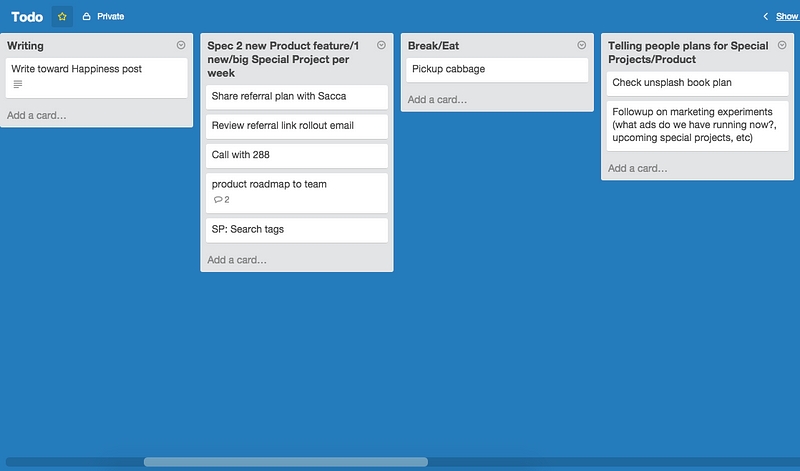
Before the ‘Writing’ column, I created a column for my morning routine and a column called ‘Not Sorted’ where I put things that come up so I can prioritize them later.
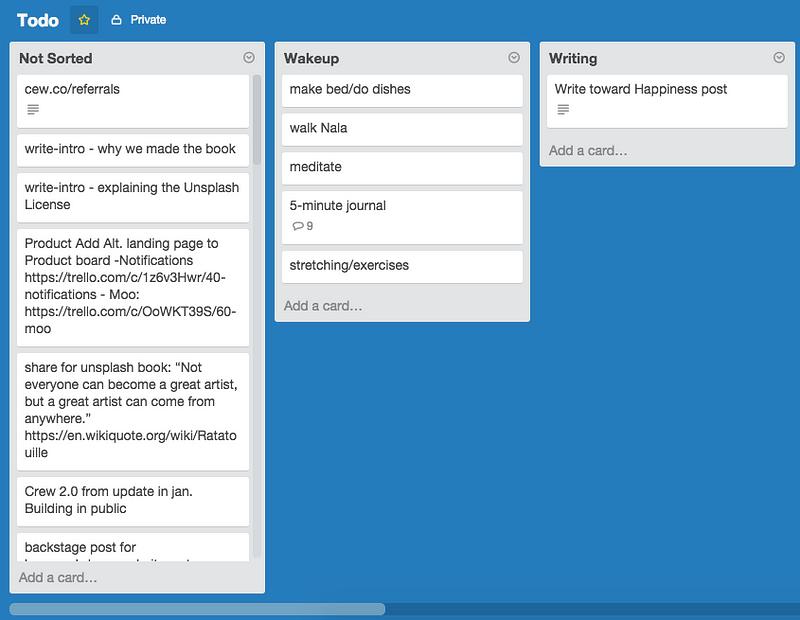
Unless a task that comes up is critical, I only look at this ‘Not Sorted’ list once I’ve done everything that has already been prioritized for the day.
Every night when I finish my work, I try to set up my to-do list for the next day. Because my to-do list columns are already in place, I get a constant reminder of what my priorities are. I just need to fill in the blanks.
Another challenge I’ve always had with my to-do list is things never getting crossed off. An important to-do item might just sit there for months and it will eat away at my motivation, stressing me out.
Because my list never changed, I didn’t see progress. Because of how I organize my list now, I can easily clear out individual tasks, which makes me feel like I’m on my way to winning the day.
With a shorter, prioritized list, you can focus on things that come up with positive energy rather than feeling stressed and doing lower quality work.
2. Overestimate your deadlines
Over the last year I tracked my personal deadlines. I only hit about a quarter of them.
Like most people, I always think I can do more. But when I miss a deadline, it becomes a source of stress. My solution for this was to make each thing I needed to do a clear action that was easy to reach.
For instance, when I write I don’t set a word count or a goal of finishing a blog post. Instead, I give myself a target of just writing each day. It could be a paragraph or a full article. As long as I write something, I win.
Only when I get close to completing a story do I change the to-do item to, ‘finish blog post’.
Setting unrealistic deadlines over and over is a recipe for burn out and makes it harder for you to keep up with a high level of quality work long-term. If you overwork yourself today and don’t do your work tomorrow, what’s the outcome? Less repeatable progress and more stress.
Someone who writes 200 words a day every day for ten days accomplishes the same thing as someone who writes 2,000 words once every ten days.
Of course if you’re in a zone, don’t stop. Write 50,000 words if you’re feeling it. But if your attention starts to fade (i.e. maybe you can’t help but look at your phone or check your favorite website) that’s a signal to break.
Things always take longer. If you get something done early, you’ll feel like you have extra time. And when was last time you felt like you had extra time?
Do as much as you can today so that you want to do it again tomorrow.
3. Do focused work. But before you do, tell the people you work with.
Just because you work more hours, doesn’t mean you’re doing more (or better) work.
Multitasking is a myth. When we try to multitask, we might feel like we’re getting more done but as research shows, we actually do less and make more mistakes.
One hour of focused work with no distractions is more valuable than three hours of work interrupted by checking texts, emails, pings, and rings.
When I first started working with no interruptions it felt awkward. I felt like I was being rude putting on my headphones and not answering people when they spoke to me. Because I was thinking about my rudeness, my mind wasn’t fully focused on my work.
I realized one of the mistakes I made was not telling the people I regularly worked with when I was going into a stretch of focused work. Not everyone works this way so if I choose to, I need to tell the people around me.
Here’s an example of a message I send my wife before I start work.

This approach has been much better than the previous one where I’d get pissed if my wife asked me something while I was in the middle of a stretch of focused work. This would almost always lead to an argument — another source of stress.
Though it takes time to message the people you work with, it’s much better than snapping at people if they ask you for something while you’re trying to focus. Or ignoring them. Both of these only lead to more stress for everyone.
4. Hang out with someone who makes you happy every day
I realized that no matter how much I have going on, taking the time do something with someone I care about makes me feel happier than trying to squeeze in a few more hours of work.
5. Sleep. But if you can’t sleep, wake up and work on what’s on your mind.
I know I usually need 7.5–8.5 hours of sleep a night to feel rested.
I noticed because I feel more stress from work-related tasks during the week, I get less sleep on average compared to a weekend.
During the week, I’ll often have one or two nights a week where I can’t sleep because my mind is racing. I used to lay in bed and try everything I could to force myself to sleep. As I lay awake longer and longer, I could feel my stress build.
I know sleep is important, so the longer I try to fall asleep, the worse I feel. So, instead of lying in bed awake when I can’t sleep, I tried something new.
If I’m restless, I wake up and work on what’s on my mind. It doesn’t matter if it’s 2am, 3am, or 4am. A half hour of working on the thing that’s circling in my head calms me down much more than rolling around for hours trying to force sleep.
Get your sleep. But if you can’t, wake up and work on what’s bugging you.
6. You don’t have to workout every day. Just move.
Though our bodies crave movement, you don’t need a huge workout to get the level of exercise you need to be healthy.
National Geographic researcher Dan Buettner studied areas of the world where people are living the longest. One thing he and his team consistently found was that the people they studied were getting a constant, low intensity amount of exercise, usually from walking, standing up and sitting down, or tending to a garden.
Staying in any one position for too long causes our blood circulation to drop. Moving gives you a moment to refresh. Whether it’s walking to your office, taking the time to stretch while you’re microwaving your lunch, or playing a sport, any type of blood flow acts as a release. It’s an opportunity to refresh your brain and make you feel good.
In between your work, move. Change positions. Lie on the floor. Switch the table you’re working at. Go for a walk.
7. Make it easy to eat healthy
From my experiment, I knew that a feeling of eating healthy was one of the leading sources of happiness for me. But what surprised me the most was that it was almost 10 times more impactful than working out and getting good sleep.
But when I start to feel hungry, I can feel my willpower weaken and cravings for bad food creep in.
So I’ve targeted foods to have around me all the time that don’t crush my energy levels and need little preparation.
This is my typical list of zero-prep, ‘healthy’ snacks I try to keep around:
- Dry Roasted Edamame
- Nonfat Greek Yogurt
- Giant bag of carrots
- Easy open cans of tuna
- Thinly sliced Turkey
(* Edit: I recently converted to veganism so I’m looking for replacements for yogurt, tuna, and turkey)
This list was created from a lot of trial-and-error looking for foods that make me feel full while giving me the nutrients I need.
If you need inspiration, this guide of food that makes you feel full but won’t make you crash might be helpful:
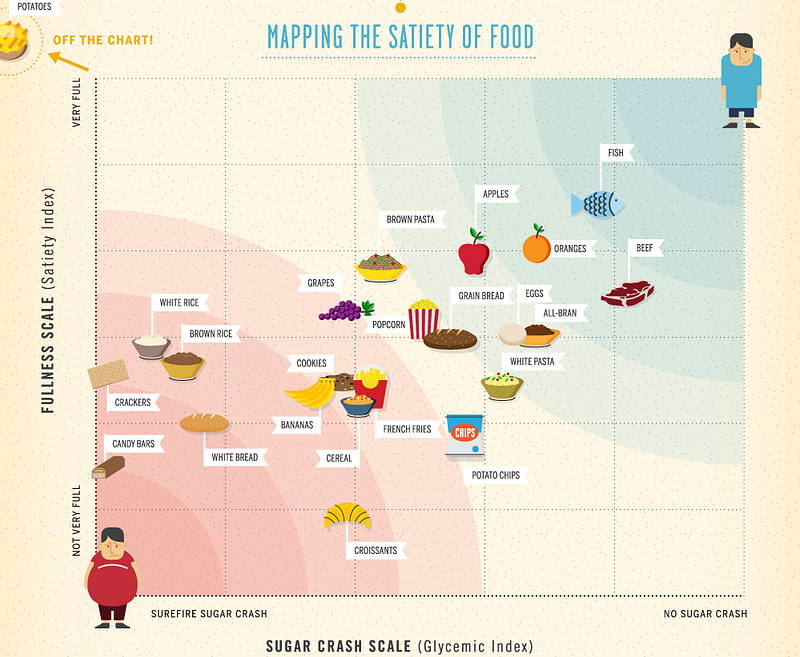
Foods that make you crash or bloat won’t make you feel happy.
8. Give 5 minutes toward daily affirmations
I’m fortunate, but I don’t think about how fortunate I am enough.
As one of the writers for our blog, Jeremy Duvall recently wrote, one of the main causes of not being grateful is something called hedonic adaptation, which is a fancy term that means we automatically adapt to good (or bad) things as they happen. When something that makes us feel good happens, like a raise, we get a momentary increase in happiness. Yet shortly after, we find ourselves dipping back down to being just as happy (or unhappy) as we were before.
To be more aware of the good things I already have more often, I’ve started setting aside 5-minutes each day to writing answers to these prompts:
To start the day:
- “I am grateful for…”
- “What would make today great?”
- “Daily affirmations. I am (i.e. creative, a happy person)…”
To end the day:
- “Three amazing things that happened today.”
- “How could I have made today better?”
I learned about this technique while listening to a podcast hosted by best-selling author and frequent writer on the topic of productivity, Tim Ferriss.
By writing down your answers to these prompts each day, you’re reminding yourself about what you should be grateful for and what you value. This exercise was derived from the psychological theory of self-affirmation which states that reflecting on your values can provide a buffer against negative things that happen. It frames your mind so that no matter what happens today, good or bad, you’re reminded that you already have things to be grateful for.
At first, I didn’t think taking the time to write what I’m grateful for would be much help. I thought it wouldn’t be much different than just thinking about what I’m grateful for more often. But after doing this for a few days, I’ve noticed I’m often more positive throughout the day. This was a big impact for something that only takes 5 minutes, the same amount of time for me to put on pants and brush my teeth.
Living for the weekend is not a life
We’re always looking forward, trying to make our lives better. And while looking forward is necessary for progress, sometimes we need to pause and look around.
We’re missing out if we’re just cycling through a stressful five days and recovering for two.
To live the life that makes you happy, identify what you’re grateful for, what makes you happy, and what makes you stressed. Then you can copy the experiment above to find ways to remove your sources of stress and add sources of happiness to each day.
If the first things you try don’t work, try again. I still don’t have the perfect formula yet but I have a clear understanding of what makes me feel content about my life.
When writer Steven Pressfield struggled with criticism, his friend Tony Keppelman told him:
“…be happy. You’re where you wanted to be, aren’t you? So you’re taking a few blows. That’s the price for being in the arena and not on the sidelines. Stop complaining and be grateful.”
Keppelman was right. Part of playing in the game is getting knocked down. That’s for sure. But the important thing is not the fact that there will be blows, but how you deal with the blows, the successes, and everything in between.
Hey there. I’m Mikael, founder at Crew, an invite-only community where you can work with top freelance designers, developers, or studios to build your app, website, or brand.
Over 100 million people have used products made by Crew members. And over 3 million people have read our blog where this post appeared first. Subscribe here to get more posts like this as soon as they’re published.
Thanks for reading and here’s a gif (of course, made on Crew 🙂


